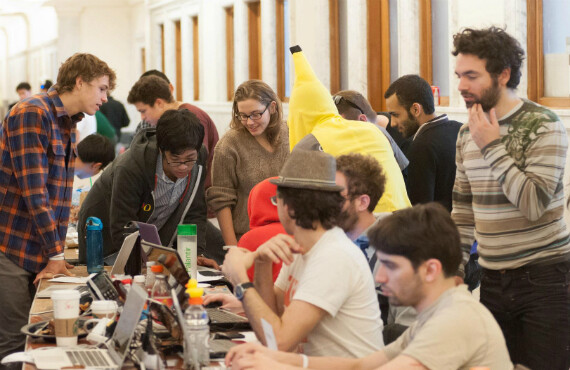Penn Engineering Brings Two Coding Contests Together with HACKfest
On Friday, September 6, more than a thousand students from about 100 universities will descend upon the University of Pennsylvania's School of Engineering and Applied Science to take part in HACKfest, a series of student-run, weekend-long software and hardware design competitions with cash prizes on the line.
PennApps is the first of these contests. Founded four years ago, it is now the largest student-run hackathon in the world. The upcoming event has attracted more than 1,600 applicants from the top computer science programs from around the globe; of the thousand selected to compete, roughly 650 will be from this national and international pool, with the rest coming from Penn.
At the heart of the immersive experience of a hackathon is the idea that the most instructive experience with coding can take place outside the walls of a classroom. In addition to the competition, there will be events aimed at non-engineers who want to break into the burgeoning field.
“We see hackathons like this as a way of developing foundational skills,” said PennApps director Brynn Claypoole, an engineering junior. “We want the next generation of great coders to get inspired and keep building.”
After Philadelphia Mayor Michael A. Nutter gives an opening address Friday evening, teams will be working in Penn's Engineering Quad and Van Pelt Library until Sunday morning to conceive, code and polish a brand-new Web or mobile application.
Once the time limit is up on Sunday morning, the teams will demonstrate their programs at an expo held in the Palestra from 11 a.m. to 1 p.m., and judges will select the top 20 applications to advance to the final round. These teams will face off with demos in a live event in Irvine Auditorium from 2 to 5 p.m., culminating with an award ceremony that will distribute at least $25,000 in prizes. The top team will take home $10,000.
Previous contestants have gone on to commercialize their creations and turn them into start-up businesses, such as Firefly, PayTango and Pagevamp.
Newer to the scene is PennHacks, which will run its second-ever event the following weekend. Like its older sibling, PennHacks features teams of coders competing against each other over an intense, two-day period.
“The difference is that, instead of 48 hours of coding, PennHacks is 48 hours of coding, soldering, wiring, sensing, actuating and creating,” said co-founder Joe Trovato, an engineering senior. “Requiring hackers to be innovative with both hardware and software is an additional challenge, but it often produces things that the computer scientists and electrical engineers would never think of on their own.”
PennHacks will provide the 100 contestants, all Penn students, with the hardware they need to complete and test their projects. The members of the top team will win $1,500 and get to keep their creation.
Last year’s top project consisted of a screen connected to a webcam that captured an outdoor scene to create a “virtual window.” The team made the effect more realistic by adding a second camera that tracked the viewer’s position and moved the outside camera accordingly, simulating the view one would have from any given angle.
Both contests have backing from major technology and venture capital companies. In addition to furnishing some of the prizes, representatives of these firms will attend the events, providing both technical insights and networking opportunities for the contestants.








